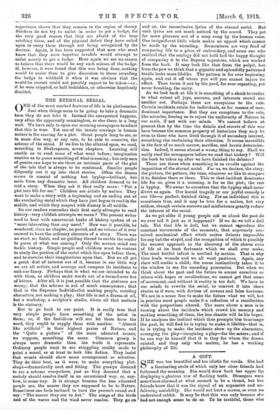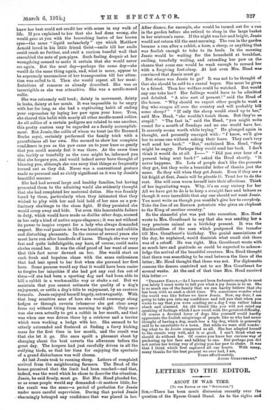A GIFT.
SHE was too beautiful and too idiotic for words. She had a fascinating smile of which only her close friends had fathomed the meaning. She would draw back her upper lip displaying a glorious row of flashing teeth. Strangers were sometimes alarmed at what seemed to be a threat, but her friends knew that it was the signal of an expansive and un- faltering amiability. She would not hurt a moose, or even an undersized rabbit. It may be that this was only because elle had not enough sense to do so. To be truthful, those who
knew her best could not credit her with sense in any walk of life. If you explained to her that she had done wrong, she would gaze at you with the beseeching lustre of her brown eyes—the same "liquid melancholy" eye which Matthew Arnold loved in his little friend Geist—smile till her smile could reach no further, and emit a curious tuneful wail that resembled the note of pan-pipea. Such feeling despair at her wrongdoing seemed to make it certain that she would never err again. But the next day—perhaps the same day—she would do the same thing again, and, what is more, appear to be supremely unconscious of her transgression till her atten- tion was called to it. Then she would repeat all her mani- festations of remorse as already described. She was as incorrigible as she was attractive. She was a needle-nosed collie.
She was extremely well bred; dainty in movement, dainty in looks, dainty at her meals. It was impossible to be angry with her for long, as she had a captivating habit of ending your reproaches by laying her paw upon your knee. True, she shared this habit with nearly all other needle-nosed collies. As all collies of a certain pedigree are related to one another, this pretty custom may be regarded as a family accomplish- ment. But Jessie, the collie of whom we treat (as Sir Bernard Burke says), certainly performed the family trick with a gracefulness all her own. She seemed to show her complete confidence in you as the paw came on to your knee so gently that you could scarely feel it was there. At the same time she, tacitly or tunefully as the case might be, informed you that she forgave you, and would indeed never have thought of blaming you, although she was sorry that things so frequently turned out as they did. Never was a conventional gesture made so personal and so richly significant as it was by Jessie's beautiful manner.
She had had several large and healthy families, but having presented them to the admiring world she evidently thought that she had completed her maternal duties. She was frankly bored by them, particularly when they intimated that they . wished to play with her and laid hold of her ears as a pi e- liminary challenge to the sham fight. If they persisted she would creep away and hide. Yet even this lamentable failure in duty, which would have made us dislike other dogs, seemed in her only a kind of native super-elegance; it was not without its power to inspire respect for a lady who always demanded respect. Her real passion in life was hunting hares and rabbits and disturbing pheasants. In the course of several years she must have run after hundreds of hares. Though she was very fast and quite indefatigable, any hare, of course, could make circles round her. It was the chief proof of her want of sense that this fact never dawned on her. She would start on each fresh and hopeless chase with the same enthusiasm that had lent speed to her feet when she pursued her first hare. Some persons would say that it would have been easier to forgive her iniquities if she had got any real fun out of them—if she had been a sporting dog and had been able to kill a rabbit in a workmanlike way or shake a rat. But we maintain that you cannot estimate the quality of a dog's enjoyment, or settle a dog's title to enjoyment, by an exoteric formula. Jessie enjoyed herself hugely, extravagantly. With that long sensitive nose of hers she would rummage along hedges or through coverts (whenever she got clear away from us) without tiring from morning to night. Only once was she seen actually to get a rabbit in her mouth, and that was when one was driven there by a retriever and a terrier which were working a hedge with her. She seemed to be utterly astounded and flustered at finding a furry kicking mass for the first time in her month, and the result was that she let it go. She once spoilt a pheasant shoot by charging about the best coverts the afternoon before the great day. The keepers had just carefully driven in all the outlying birds, so that her time for enjoying the spectacle of a grand disturbance was well chosen.
At last Jessie took to running sheep. Letters of complaint arrived from the neighbouring farmers. The Head of the house perceived that the limit had been reached—and that, indeed, was the word which he chose to describe the situation. Jessie, he said firmly, must go. But Mrs. Head pleaded for, or as some people would say demanded—it matters little, for the result was the same—a period of probation for Jessie under more careful supervision. During that period Jessie charmingly betrayed any confidence that was placed in her. After dinner, for example, she would be turned out for a run in the garden before she retired to sleep in the large basket in her mistress's room. If the night was fair and bright, Jessie would not return till the next morning. The run in the garden became a run after a rabbit, a hare, a sheep, or anything that was foolish enough to take to its heels. In the morning Jessie would be waiting for the household at breakfast, smiling, tunefully wailing, and extending her paw on the chance that some one would be weak enough to reward her with a forgiving foot-clasp. At last even Mrs. Head was convinced that Jessie must go.
But where was Jessie to go? It was not to be thought of
that she should be sold to a casual buyer. She must be given to a friend. Then her welfare could be watched. But would any one take her ? Her failings would have to be admitted and detailed. "A. nice sort of present !" said the Head of the house. "Why should we expect other people to want a dog who ranges all over the country and will probably kill some sheep?" "If only the sheep would stand up to her," said Mrs. Head, "she wouldn't touch them. But they're so stupid." "The fact is." said the Head, "you might write round for a month of Sundays and no one would have her. It scarcely seems worth while trying." He plunged again in thought, and presently emerged with : "I know, we'll give her to come one without asking their leave. They can't very well send her bask." "But," exclaimed Mrs. Head, "they might be angry. Perhaps they would send her back. I don't think it would do at all. " "Did you ever hear of a present being sent back?" asked the Head shortly. "It never happene. No. Lots of people don't like the presents they get, but they write a beautiful letter of thanks just the
same. So they will when they get Jessie. Even if they are a bit frigid at first. Jessie will be planree la. Trust her to do the rest. She will soon worm herself into their affections. Think of her ingratiating ways. Why, it's an easy victory for her All we have got to do is to keep a straight face and behave as though it were incredible that any one should not want Jessie. You must write as though you wouldn't give her to seeryltedy. Take the hue of an Eastern potentate who gives an elephant to the King of another country."
So the shameful plot was put into execution. Mrs. Head wrote to Mrs. Greatheart to say that she was sending her a very precious animal as a birthday present. It was the Machiavellism of the man which postponed the transfer till Mrs. Greatheart's birthday. The genial associations of the day, he explained, would diminish what small risk there was of a rebuff. He was right. Mrs. Greatheart wrote with as much love and gratitude as could be expected to acknow- ledge the arrival of the beautiful creature. Mrs. Head thought that there was something to be read between the lines of the letter; Mr. Head thought that there was not. For diplomatic reasons the donors contrived not to see Mrs. Greatheart for several weeks. At the end of that time Mrs. Head received this letter
"DZAAHAT Enstr,—As I have not been fortunate enough to meet you lately I must write to tell you what a joy Jessie is to us. She is so much one of the family that we can hardly believe that she has been with us such a short time. We sometimes wonder what the world was like before we knew Jessie. Now, my dear, I am going to take you into my confidence and tell you that when you wrote to say that you were sending me a dog I was rather taken aback and alarmed. An old friend like you will not mind my speaking of feelings which I now recall with the greatest difficulty. Of course a devoted lover of dogs like yourself could hardly appreciate the foolish misgivings of people like us who had never thought of having a dog, much loss a big dog, which is generally said to he unsuitable to a town. But while ,vs were still wondm ing what to do Jessie conquered us all. She has adapted herself to the streets very well, and is so good. I can't think what we should do without hor. Of course you know her curious way ot puckering up her face and talking to one. But perhaps you did not notice her loving way of giving you her paw to shake. It was that I think which first captured all our hearts. With many, many thanks for the beet present we ever had, lam,
Yours affectionately,
AGNES GRELTHEART."











































 Previous page
Previous page